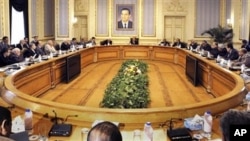Egypt's largest opposition group, the Muslim Brotherhood, is participating in unprecedented talks with the government, as protesters calling for an end to President Hosni Mubarak's nearly 30-year rule rallied for a 13th day.
Demonstrators are preventing the army from clearing even a part of Tahrir square, the epicenter of nearly two weeks of anti-government protests. Some have turned themselves into human shields in front of tanks. But the army is not using force. In fact, its blockades are helping to protect the protesters.
Calling this the "Day of Martyrs," Muslims and Coptic Christians offered prayers for the hundreds of pro-democracy activists killed since their uprising began on January 25.
The newly appointed Egyptian vice president, Omar Suleiman, met with a coalition of opposition groups, including representatives of the Muslim Brotherhood. Egyptian government officials have never before openly met the Islamist group, which is officially banned in Egypt.
The Muslim Brotherhood is the largest opposition faction, but did not take a leading role in the protests. Many of its members fought in recent days' street battles against Mubarak supporters.
One protester on Tahrir Square says he worries the group's ultimate aim is to turn Egypt into an Islamic state.
"I'm Muslim, but I do not like Iran, like Hezbollah or something like that," he said.
Although the group is banned, its members have run as independents in elections. In 2005, they captured around 20 percent of the vote. The Muslim Brotherhood leads a peaceful political and social movement aimed at forming an Islamic state.
But the group now is deliberately taking a back seat in the protests. A spokesman has credited young Egyptians with starting the uprising. And several days ago, the group said it will not field a candidate in the next presidential election.
"What else can they do? They issued a statement, they participated in the last Parliament, they did not talk about Sharia or even an Islamic state, stuff like that, but [talked about] defending the people's demands," said Fahmy Howeidy, a columnist for the daily newspaper, Shorouk. "And they are still doing that."
After nearly two weeks of unrest, life is beginning to return to normal in Egypt. Banks and businesses reopened for at least a few hours. But a key opposition leader, Nobel laureate Mohamed ElBaradei, is warning that the protests could get what he called "more vicious" if Mubarak continues in power.
Protests Continue in Egypt; Muslim Brotherhood Joins Crisis Talks




